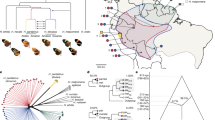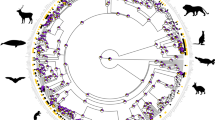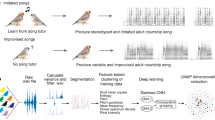Abstract
Ant queens are among the most long-lived insects known1,2. They mate early in adult life and maintain millions of viable sperm in their sperm storage organ until they die many years later3,4. Because they never re-mate, the reproductive success of queens is ultimately sperm-limited, but it is not known what selective forces determine the upper limit to sperm storage. Here we show that sperm storage carries a significant cost of reduced immunity during colony founding. Newly mated queens of the leaf-cutting ant Atta colombica upregulate their immune response shortly after completing their nest burrow, probably as an adaptive response to a greater exposure to pathogens in the absence of grooming workers. However, the immune response nine days after colony founding is negatively correlated with the amount of sperm in the sperm storage organ, indicating that short-term survival is traded off against long-term reproductive success. The immune response was lower when more males contributed to the stored sperm, indicating that there might be an additional cost of mating or storing genetically different ejaculates.
This is a preview of subscription content, access via your institution
Access options
Subscribe to this journal
Receive 51 print issues and online access
$199.00 per year
only $3.90 per issue
Buy this article
- Purchase on Springer Link
- Instant access to full article PDF
Prices may be subject to local taxes which are calculated during checkout



Similar content being viewed by others
References
Keller, L. & Genoud, M. Extraordinary lifespans in ants: a test of evolutionary theories of ageing. Nature 389, 958–960 (1997)
Pamilo, P. Life span of queens in the ant Formica exsecta. Insect. Soc. 38, 111–120 (1991)
Wheeler, D. E. & Krutzsch, P. H. Ultrastructure of the spermatheca and its associated gland in the ant Crematogaster opuntiae (Hymenoptera, Formicidae). Zoomorphology 114, 203–212 (1994)
Hölldobler, B. & Bartz, S. H. in Experimental Behavioural Ecology and Sociobiology (eds Hölldobler, B. & Lindauer, M.) 237–257 (Gustav Fischer, Stuttgart, 1985)
Birkhead, T. R. & Møller, A. P. Sperm Competition and Sexual Selection (Academic, New York, 1998)
Eberhard, W. G. Female Control: Sexual Selection by Cryptic Female Choice (Princeton Univ. Press, Princeton, 1996)
Simmons, L. W. Sperm Competition and its Evolutionary Consequences in the Insects (Princeton Univ. Press, Princeton, 2001)
Baer, B. Sexual selection in Apis bees. Apidologie (Celle) 36, 187–200 (2005)
Breque, C., Surai, P. & Brillard, J. P. Roles of antioxidants on prolonged storage of avian spermatozoa in vivo and in vitro. Mol. Reprod. Dev. 66, 314–323 (2003)
Boomsma, J. J., Baer, B. & Heinze, J. The evolution of male traits in social insects. Annu. Rev. Entomol. 50, 395–420 (2005)
Tschinkel, W. R. & Porter, S. D. Efficiency of sperm use in queens of the fire ant, Solenopsis invicta (Hymenoptera: Formicidae). Ann. Entomol. Soc. Am. 81, 777–781 (1988)
Crozier, R. H. & Page, R. E. On being the right size: Male contributions and multiple mating in social hymenoptera. Behav. Ecol. Sociobiol. 18, 105–116 (1985)
Boomsma, J. J., Schmid-Hempel, P. & Hughes, W. O. H. in Insect Evolutionary Ecology (eds Fellowes, M., Holloway, G. & Rolff, J.) 139–175 (CABI, Wallingford, 2005)
Weber, N. A. Gardening Ants: The Attines (American Philosophical Society, Philadelphia, 1972)
Fowler, H. G., Pereira da Silva, V., Forti, L. C. & Saes, N. B. in Fire Ants and Leaf Cutting Ants: Biology and Management (eds Lofgren, C. S. & Vander Meer, R. K.) 123–145 (Westview Press, Boulder, Colorado, 1986)
Baer, B. & Schmid-Hempel, P. Effects of selective episodes in the field on life history traits in the bumblebee Bombus terrestris. Oikos 101, 563–568 (2003)
Baer, B. & Schmid-Hempel, P. Sperm in fluences female hibernation success, survival and fitness in the bumblebee Bombus terrestris. Proc. R. Soc. B 272, 319–323 (2005)
Rolff, J. & Siva-Jothy, M. T. Invertebrate ecological immunology. Science 301, 472–475 (2003)
Fjerdingstad, E. J. & Boomsma, J. J. Multiple mating increases the sperm stores of Atta colombica leafcutter ant queens. Behav. Ecol. Sociobiol. 42, 257–261 (1998)
Hölldobler, B. & Wilson, E. O. The Ants (Springer, Berlin, 1990)
Tian, H. S., Vinson, S. B. & Coates, C. J. Differential gene expression between alate and dealate queens in the red imported fire ant, Solenopsis invicta Buren (Hymenoptera: Formicidae). Insect Biochem. Mol. Biol. 34, 937–949 (2004)
Fjerdingstad, E. J. & Boomsma, J. J. Variation in size and sperm content of sexuals in the leafcutter ant Atta colombica. Insect. Soc. 44, 209–218 (1997)
Baer, B. & Boomsma, J. J. Male reproductive investment and queen mating frequency in fungus growing ants. Behav. Ecol. 15, 426–432 (2004)
Baer, B. & Schmid-Hempel, P. Unexpected consequences of polyandry for parasitism and fitness in the bumblebee, Bombus terrestris. Evolution Int. J. Org. Evolution 55, 1639–1643 (2001)
Baer, B. & Schmid Hempel, P. The artificial insemination of bumblebee queens. Insect. Soc. 47, 183–187 (2000)
Fjerdingstad, E. J., Boomsma, J. J. & Thoren, P. Multiple paternity in the leafcutter ant Atta colombica—a microsatellite DNA study. Heredity 80, 118–126 (1998)
Acknowledgements
We thank D. R. Nash for advice on statistical issues; C. Andersen and S. Mathiasen for assistance with DNA work; S. Mathiasen and D. J. C. Kronauer for advice on DNA work; S. P. A. den Boer, M. Poulsen, A. M. Schmidt, J. Thomas and L. V. Ugelvig for assistance in the field, and P. D'Ettorre, D. R. Nash, J. S. Pedersen, B. Baer-Imhoof and L. W. Simmons for comments on the manuscript. This study was supported by the Swiss National Science Foundation (stipend for advanced scientists to B.B.), the EU Research-Training Network INSECTS, the Carlsberg Foundation and a Marie Curie Intra-European Fellowship (postdoctoral stipends to S.A.O.A.), the Danish Natural Science Research Council (B.B. and J.J.B.) and the Danish National Research Foundation (J.J.B. and S.A.O.A.). We thank the Smithsonian Tropical Research Institute in Panama for facilities and logistical support, and the Autoridad Nacional de Ambiente (ANAM) of Panama for issuing collection and export permits.
Author information
Authors and Affiliations
Corresponding author
Ethics declarations
Competing interests
Reprints and permissions information is available at npg.nature.com/reprintsandpermissions. The authors declare no competing financial interests.
Supplementary information
Supplementary Notes
This file contains further information about the methodology used for the study, as well as additional data supporting the main manuscript. (DOC 75 kb)
Rights and permissions
About this article
Cite this article
Baer, B., Armitage, S. & Boomsma, J. Sperm storage induces an immunity cost in ants. Nature 441, 872–875 (2006). https://doi.org/10.1038/nature04698
Received:
Accepted:
Issue Date:
DOI: https://doi.org/10.1038/nature04698
This article is cited by
-
Functional transcriptome analyses of Drosophila suzukii midgut reveal mating-dependent reproductive plasticity in females
BMC Genomics (2022)
-
Experimental increase of worker diversity benefits brood production in ants
BMC Ecology and Evolution (2021)
-
Seminal fluid proteins induce transcriptome changes in the Aedes aegypti female lower reproductive tract
BMC Genomics (2021)
-
Trade-offs between sperm viability and immune protein expression in honey bee queens (Apis mellifera)
Communications Biology (2021)
-
Immune Defense Strategies of Queens of the Social Parasite Ant Acromyrmex ameliae and Queens of Its Natural Hosts
Neotropical Entomology (2021)
Comments
By submitting a comment you agree to abide by our Terms and Community Guidelines. If you find something abusive or that does not comply with our terms or guidelines please flag it as inappropriate.



